
Vulnerability has often been perceived by professionals and the public as a negative trait, non-adaptive quality and unhealthy state of being. In the minds of people it signifies weakness and a lack of strength and moral fortitude. One prominent researcher and noted personality, Dr. Brene Brown, in numerous of her publications has shifted dramatically the narrative and dialogue on vulnerability. She has turned vulnerability on its head, and this once-viewed deficit in character has now become in many circles a virtue. In doing so, Dr. Brown has made the concept of vulnerability into a prerequisite and integral part to what it means to be a fully deep and sensitive human being.
In this article, the goal is to tie the essence of vulnerability into a path toward a deeper understanding of the approaching chag of Sukkot and how being vulnerable and dependent on Hashem gives us authentic meaning and ultimately control of our lives. The prevailing worldview in our culture is that we are the masters of our destiny and fate. We inherently feel that our choices in life determine and dictate our final outcomes in broad areas of existence. A humbling awakening is to revisit this longstanding and misguided belief. It might be ideal if we could come to this realization without setbacks and suffering, but these travails and tests remind us of our finiteness and fragility. And through them it is part of our growth process. It is also the recognition that comes with the chag of Sukkot, as we leave the comforts of our homes, like our ancestors, and connect to the past. We become much more aware that we are dependent beings, unlike the secular mindset of our current age.
In highlighting this point, we would like to offer some practical suggestions in how to develop a more spiritual and appropriate awareness and way to engage the chag of Sukkot with a sense of humility and accompanying vulnerability.
• Sukkot is a time to reflect on how grateful we are for everything and that leaving our homes transfers our faith and trust in God and not to humans or outside external forces.
• We are dependent, finite, fragile and vulnerable humans. We should embrace this and not be fearful or avoid confronting this reality.
• The chag is about joy, knowing deep down inside we do not have to be in control and can still put our best efforts forward. In this way outcomes are not up to us. There is freedom that comes with this recognition.
• It makes us human to be vulnerable, not the contrary. Being vulnerable, as mentioned above, is central to the human condition. It also connects us to each other and assists us in feeling less alone in the universe.
• Simcha is not about having it all, it is about letting go and being able to be, as the famous quote states in our tradition, “who is the rich man, the one who is happy with his lot.” A tall order to internalize, but it decreases our dependence on things to make us happy. Cultivating a rich internal life, not hyper-focusing on the external one, is where profound satisfaction lies in life.
• To be an “I” we share our vulnerability, which brings us greater intimacy so one can become a “we.”
• The more meaningful our lives are and the greater we fulfill our potential, then the less vulnerable we are to our mortality. It is part of the human condition that we are “all” vulnerable to a limited time in this world. It is our greatest burden and equally greatest challenge at the same time to live in spite of this reality. Sukkot reminds us of all this and more.
• If we make mistakes, we should admit them and not cover them over. This helps us grow and makes being vulnerable less intimidating.
• We should cherish our relationships and nurture them.
• Sukkot is about coming to terms with the uncertainty and tenuousness of our lives. It is also about being okay with not having all the answers and searching for intrinsic meaning. As therapists, we try to help our patients find existential purpose with whatever challenges they may be facing. In these therapeutic encounters, Buber’s “I Thou” connection is formed and vulnerability is embraced.
• By not being vulnerable we assume that a protective shield is in place, whereas it only reinforces isolation and alienation from God, self and others.
• We live more authentically if we keep a close focus on the fundamental fact that our existence is a miracle in itself. It is vital not to be distracted and lose sight of our priorities and live life boldly and genuinely.
• Yiddishkeit offers deep roots, richness, depth and can fortify our power to achieve our potential, even while feeling and being vulnerable.
Sukkot is a special chag with its own themes that we tried to encapsulate and concretize in this article. A universal thread is the deeply held and cherished worldview that the act of self-revelation and sharing one’s vulnerabilities creates heighted acceptance of our purpose in the world. It opens doors and vistas to explore unarticulated and novel parts of our self. In addition, it strengthens our relationship with others and dependence on God. Our responsibility is to create a higher loyalty to our striving for truth and not simply the ephemeral. It is understood that we cannot control the uncontrollable and need to be mindful of our individual tafkid. We are morally obligated to be the authors of our lives through our choices and actions. Sukkot confronts us with the acknowledgement that the architect of it all is Hashem. This vulnerability makes us special and unique, which parallels the message of Sukkot.
Chag sameach, and wishing all of you only joy and simcha the entire year.
Dr. Michael Portman, DPhil, LCSW, ACT can be reached at meport18@gmail.com. Anna Ostro-Portman, LCSW, can be reached at annaostrolcsw@gmail.com.









